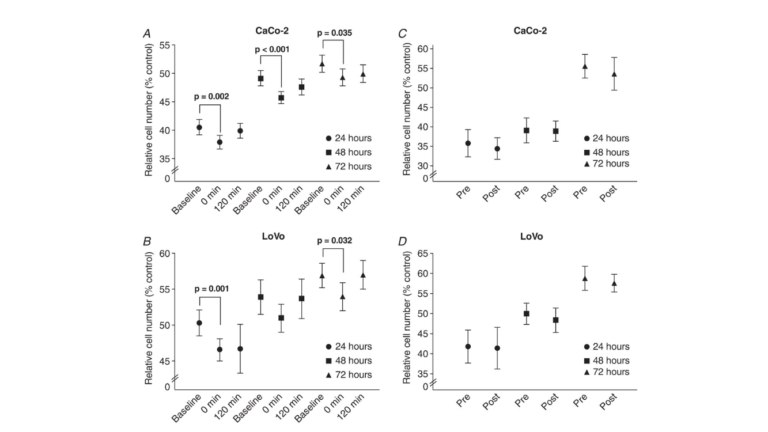In this study published in the February 2019 issue of The Journal of Physiology, a research team from the University of Queensland investigated exercise’s known effect on mortality rates for cancer survivors by observing male colon cancer survivors’ blood cytokine levels during a month of high-intensity interval exercise (HIIE). Their conclusions were:
- Physical activity is associated with reduced mortality rates for survivors of colorectal cancer.
- Acute HIIE reduced colon cancer cell numbers in vitro and promoted increases in inflammatory cytokines immediately following exercise.
- This acute suppression of colon cancer cell number was transient and not observed at 120 minutes post-acute HIIE.
- The acute effects of exercise may constitute an important mechanism that can influence colorectal cancer outcomes.
The study followed 20 male colon cancer survivors who were split into two groups. Ten men were prescribed a brief, strenuous workout regimen: four minutes of hard cycling, three minutes of rest, repeated four times, three days per week. The subjects did this course of exercise for one month. The other 10 did a single exercise session of the same program.
The researchers took blood from these subjects before, immediately after, and two hours after an exercise session, then incubated cancer cells with the blood. The blood drawn immediately after exercise showed higher cytokine levels (i.e., inflammatory markers, including IL-6 and TNF-a), which subsided within two hours. This same cytokine-rich blood also suppressed tumor growth. There was no difference in the magnitude of this effect (either the cytokine elevation or the tumor growth suppression) in subjects who did a single HIIE session and those who had done three sessions per week over four weeks.

Figure 1. Cell number before or after acute high intensity interval exercise or short‐term training
Cell number following incubation of (A) CaCo‐2 and (B) LoVo cells with serum from either baseline (pre‐exercise), 0 or 120 min post‐high intensity interval exercise, or (C) CaCo‐2 and (D) LoVo cells with serum collected at rest (fasting) either pre‐ or post‐exposure to short‐term high intensity interval exercise training (baseline and post‐intervention). Cells were incubated for 24, 48 or 72 h. Data presented as the mean and 95% CI.
These data suggest exercise temporarily increases levels of blood inflammatory markers, and these increases may suppress tumor growth. The authors note that while a single bout of exercise is unlikely to meaningfully impact tumor growth, a long-term exercise program that repetitively induces cytokine elevation may improve cancer prognosis. This beneficial inflammatory effect could explain the widely observed benefits of exercise on cancer risk and prognosis.